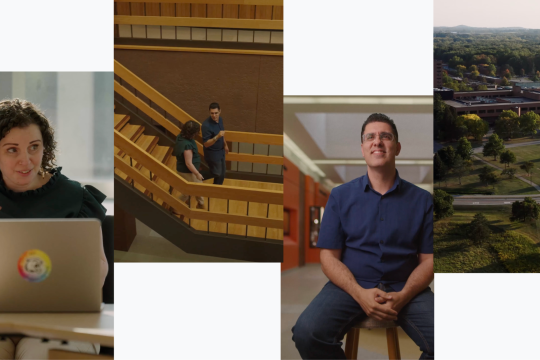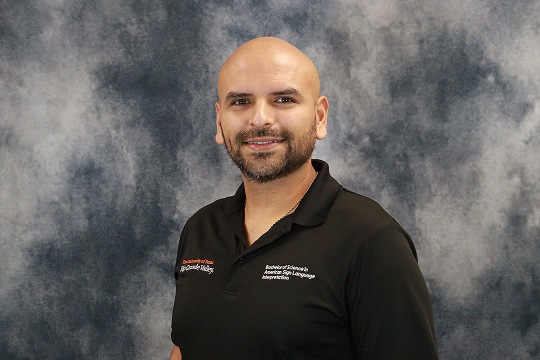NTID AlumniNews
RIT/NTID alumnus builds a career in law enforcement to make a positive difference in the lives of others

RIT/NTID 2019 criminal justice graduate Cortez Harris launched his career in law enforcement to help people and make a positive impact on his community. He is a passionate advocate for social justice, dedicated to the principle that people deserve equal rights and opportunities and ensuring they get the support they need.
Last summer, Harris landed a new job at the Wisconsin Department of Corrections as a probation and parole officer, helping offenders transition back to the community by offering resources, treatment, and life changing skills. Prior to joining this department, he worked as a security officer for security companies based in Milwaukee, Wisconsin.
While an undergraduate student at RIT, he was involved in extracurricular activities with student-led organizations such as Ebony Club and the Criminal Justice Student Association, which helped him gain critical communication, problem-solving and leadership skills to prepare for a successful career. He says his involvement in activities with organizations benefited him in his ability to advocate for the community and make a difference in lives of others.
Because of Harris’ leadership as a student and his dedication to the community, he received several awards, including NTID’s Outstanding Leadership Award, Dale Carnegie’s Future is Bright Award, and membership in M.O.C.H.A (Men of Color, Honor, and Ambition). Outside of RIT, he has spent time volunteering with the National Black Deaf Advocates and H.E.A.R.D (Helping Educate to Advance the Rights of the Deaf).
As a proud Tiger alumnus with a passion for helping promote safety and well-being for individuals and communities, Harris says he uses his challenging, yet rewarding, profession to help him make an impact and meaningful difference in the lives of others.
What made you interested in studying criminal justice at RIT?
I have always had a passion for being an advocate and a person who speaks up on social justice issues. I wanted to study criminal justice at RIT because I knew I could make a difference in people's lives and could help those who were involved with the criminal justice system. I wanted to study this field so I could give back to my community. I can now say that I have been able to protect people from criminal activity, and I help victims by ensuring justice and support. I also help rehabilitate and motivate offenders in the system through cognitive interventions.
How did your education at RIT help you prepare for your success in your career?
My education at RIT/NTID greatly helped me prepare for success in my career. While taking classes there, I had many great professors with lots of support. I took a lot of classes that helped me understand theories and criminology. The classes I took at RIT helped me understand how a criminal offender thinks and what makes them recidivate, which means them relapsing back into criminal behavior. The education I received at RIT/NTID was like none other, and it helped me become professional, hard-working, focused and determined.
Please share your work experience in the criminal justice field.
I just started working as a probation and parole agent for the Wisconsin Department of Corrections in June 2022. So far, I have been able to help monitor and support those offenders who are on probation and parole by helping them reintegrate back into the community after they are released from prison. Many offenders today struggle to find jobs and housing or don’t know how to properly interact with people in the community. My job is to help them develop those skills and also to help them not get into trouble again by holding them accountable. My work consists of having a caseload of offenders to supervise where I meet with them every week to ensure they are meeting their goals and court ordered requirements.
I like being a probation and parole agent because I am able to give people in the criminal justice system the treatment and resources they need, such as mental health services, temporary housing, alcohol/ drug treatment, victim services, and much more. During each meeting, I typically spend time with each client for case planning. I check in with them, review, and do some sort of intervention with them, whether it be a skill card activity, discussion, or maybe even doing some sort of role play with them to help them make better decisions and choices in the community.
What has been the most interesting, challenging and rewarding parts of your job?
The most interesting and challenging part of my job so far is that it can be very busy at times. I don’t just sit around in the office and talk to clients every day. I also do a lot of other things such as going to the jail/prisons to take written statements, doing a lot of paperwork, going to the courts to testify, doing home visits with clients and sometimes arresting and detaining clients. One of the most challenging things is tolerating clients’ bad behaviors. Sometimes clients can be very argumentative and don’t want to comply or co-operate with you. This has also been a rewarding part of my job because now I am learning new skills on how to resolve conflict and to use motivational interviewing tactics when a client is very angry or frustrated at me. So, I have the ability to change the conversation into something positive and work with them.
Did your involvement in community and extracurricular activities at RIT contribute to your success today? If so, how?
Being in many clubs and organizations at RIT/NTID definitely has led to my success today. It taught me to stand up and do what is right for myself and for my community. I can use everything I learned in those clubs for my job. For example, working as a probation and parole agent, I was able to help a deaf person and their agent with case management and communication. I am currently in the process of working with the higher authorities on developing a deaf and hard-of-hearing bi-lingual unit. So far, we only have separate units for those clients on probation who speak Spanish, French or other languages, but there is no specialty unit for those clients who are deaf or hard of hearing. So, I am figuring out a way to establish a unit for those offenders, which is exciting for me because I feel it is very important since I’ve always been a huge advocate for my community. I am currently involved in the department of corrections diversity committee where I am also taking the lead on hosting an event and workshop related to deaf and hard-of-hearing culture and awareness for the month of September. I have not only been able to make a difference with those clients who are on probation, but I have also been able to make a difference outside of that by being involved in different committees and teaching my co-workers ASL. Being in many clubs and organizations at RIT/NTID has allowed me to continue to make a major impact on people and make a difference in the world.
What accomplishments are you most proud of?
I am most proud of being able to make a difference in the community and to be able to have a positive impact on people’s lives. I am proud to be able to give back and support those who are in need. I am proud to never give up hope and despite all the challenges I have been able to overcome them and have a lot of success. I am proud to be an RIT/NTID alumni. I am proud of who I am and who I’ve become.
What advice do you have for RIT/NTID students who may be interested in pursuing a career in criminal justice?
My advice for those RIT/NTID students who may be interested in pursuing a career in criminal justice is to DO IT. I would say if you have a strong passion for giving back to your community and doing something for the greater good, then this field is definitely for you. My advice would be don’t give up because criminal justice is very rewarding in the end, and you will learn a lot for sure.
What is something that people would be surprised to learn about you?
The thing that people would be surprised to learn about me is that I am very multi-talented. I sing and write my own songs; I'm a pretty good actor on stage; I am a performer; I am an influencer; I am a leader; I am a wrestler; and I am so much more.








